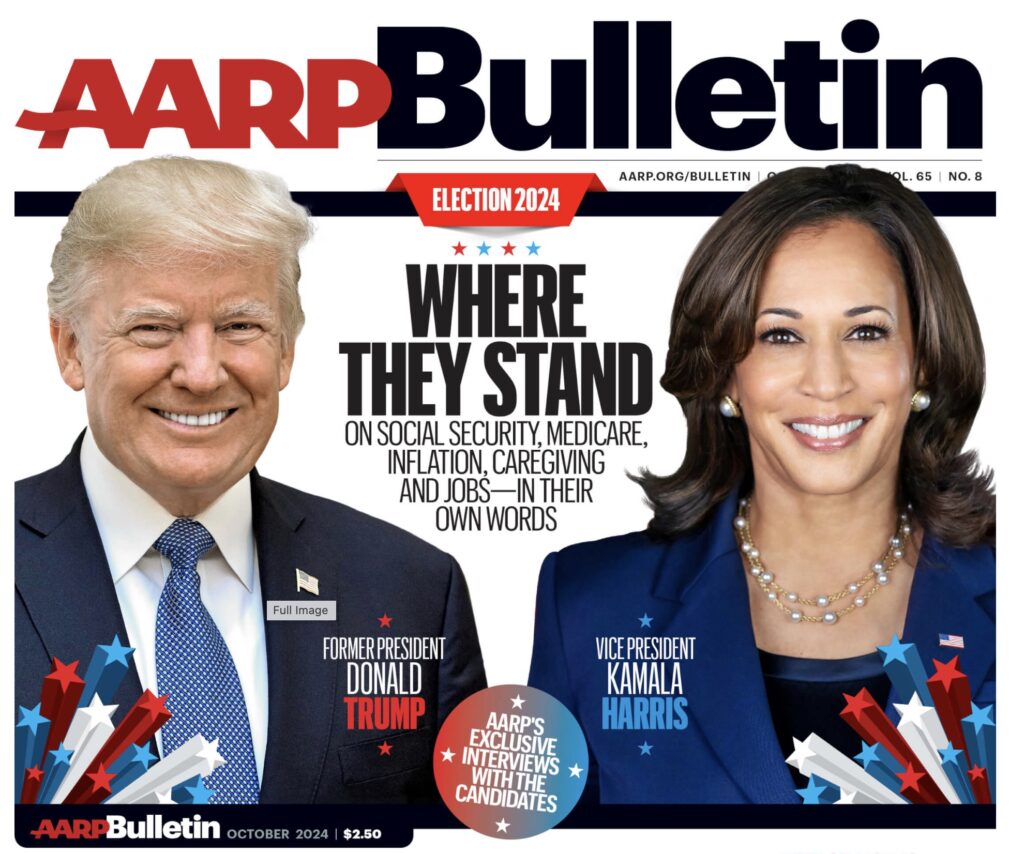
The cover of the October AARP Bulletin, pictured above, highlights an article where the two Presidential candidates’ respond to questions on a variety of issues, as asked in phone interviews with each one. The AARP informs readers that the article was edited for “clarity and length” and there was no fact-checking.
Aside from the absence of fact-checking, it sounds innocent enough. Potentially useful even.
So…what’s wrong with this picture? Why am I objecting to this article?
Because the article is guilty of two all-too-common journalistic sins — especially relevant when dealing with Trump. It’s not the worst-case example of these sins, but it’s still worth calling out.
Sin #1 is sane-washing — selective editing and choosing of headlines, designed to make Trump’s words and actions seem much more sane than they actually are. And thereby allowing him to be perceived as a more rational and acceptable candidate than he actually is.
That’s why, in my admittedly biased view, I object to the entire idea of this article. By presenting Trump and Harris as co-equals, without comment, it elevates Trump to a level he does not deserve.
To be fair, the article does expose Trump’s utter shallowness and incompetence — by simply quoting him. For example, when asked “How would you ensure that Americans have access to affordable high-speed internet?,” Trump replied:
“We’ll build out our internet system. Biden has done nothing. He’s done very little on that, but we’re going to build out our internet system. It’s moving. We had it really going along good, and then a lot of it was stopped, but we’re going to be building out our internet system. They have to have access.”
Really? Compared to Harris’ much more specific and cogent answer, Trump’s reply was a nonsensical embarrassment. And that is typical of Trump. Whenever you really listen to what he says, you realize he has no concrete policies. At best, he has assertions, not backed up with details nor tethered to reality. A few examples (from other sources):
• At his lone debate with Harris, Trump conceded that, even after 8 years of promising to entirely trash Obamacare, he still has no specific plan for what he would do instead. He has only “the concept of a plan.”
• Speaking at the Economic Club of New York, when asked what he would do about the cost of child care, his response was so rambling and incoherent that it became fodder for satire.
• Finally, during an interview with Bloomberg, Trump was challenged to defend his proposal to dramatically raise tariffs (something widely panned as dangerous by almost all economists). His reply was “ignorant of basic economic principles, insisting that other countries, not American consumers, would pay for the tariffs.”
A brief aside: The subject of tariffs never appears in the AARP article. AARP might want a pass here because their questions were very tightly focused on issues especially affecting older Americans (e.g., Medicare, Social Security). Still, older people will not be immune to the economic consequences of tariffs. And it is the linchpin of Trump’s economic platform. It could well have been included.
So, yes, I object to how the article — beginning with the picture on the cover — creates the impression that that each candidate has legitimate positions for you to consider. In most other presidential races, this would be an entirely reasonable, even laudable, thing to do. Because both candidates would have legitimate positions. But not in this one.
This segues into sin #2: The normalization of Trump — treating him as if he is a “normal” Republican and “typical” candidate for President — thereby providing “permission” to select his name on the ballot.
This gets to the most egregious aspect of the AARP interview: the critical questions that the article never asked. Specifically, there were no questions about threats to democracy, no questions asked about the Big Lie or January 6th, no questions about the appropriateness of a convicted felon running for office, Trump is completely let off the hook here. While one could again argue that these questions were beyond the scope of the AARP interview, doing so entirely misses the point:
In this particular election, the differing positions of the two candidates should not be the determining factor — because it is fundamentally not an election about positions. Rather, it is an election about the characteristics of the candidates themselves.
It is an election that demands you consider how anyone could vote for a candidate — Trump — who is so completely unqualified and totally unworthy of any elected position, least of all POTUS. What does it matter where Trump stands on crime or inflation or whatever — when he is a criminal who tried to violently overturn an election?
It is also an election about the candidates’ mental competence. And Trump’s substantial cognitive decline has been clearly on display for the past several months — perhaps only now getting the recognition it deserves. How can you vote for a candidate who, regardless of his stated positions, has descended into the depths of vulgarity and lacks even a modicum of self-restraint — to the point that the word “dementia” is being increasingly used to describe his current condition?
I can almost understand how the AARP might have felt it would violate its “nonpartisan” stance to delve into these matters. But I cannot stress enough: To ignore these matters is to sidestep what must be the defining issue in determining our next President. And, if this sidestepping ultimately contributes to a Trump success in November, it will have contributed to a catastrophic outcome for the country.
October 22: Several revisions were made.
